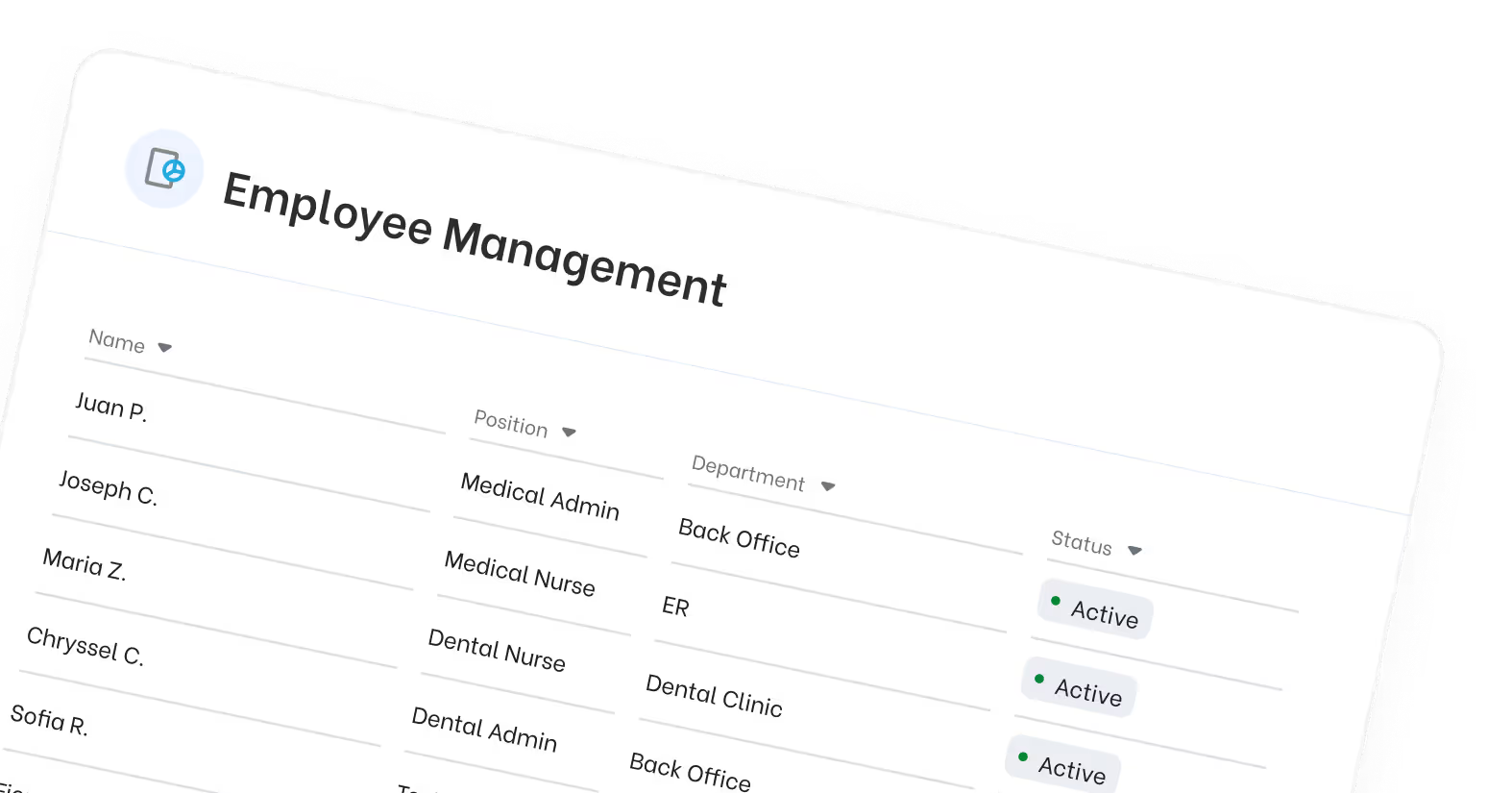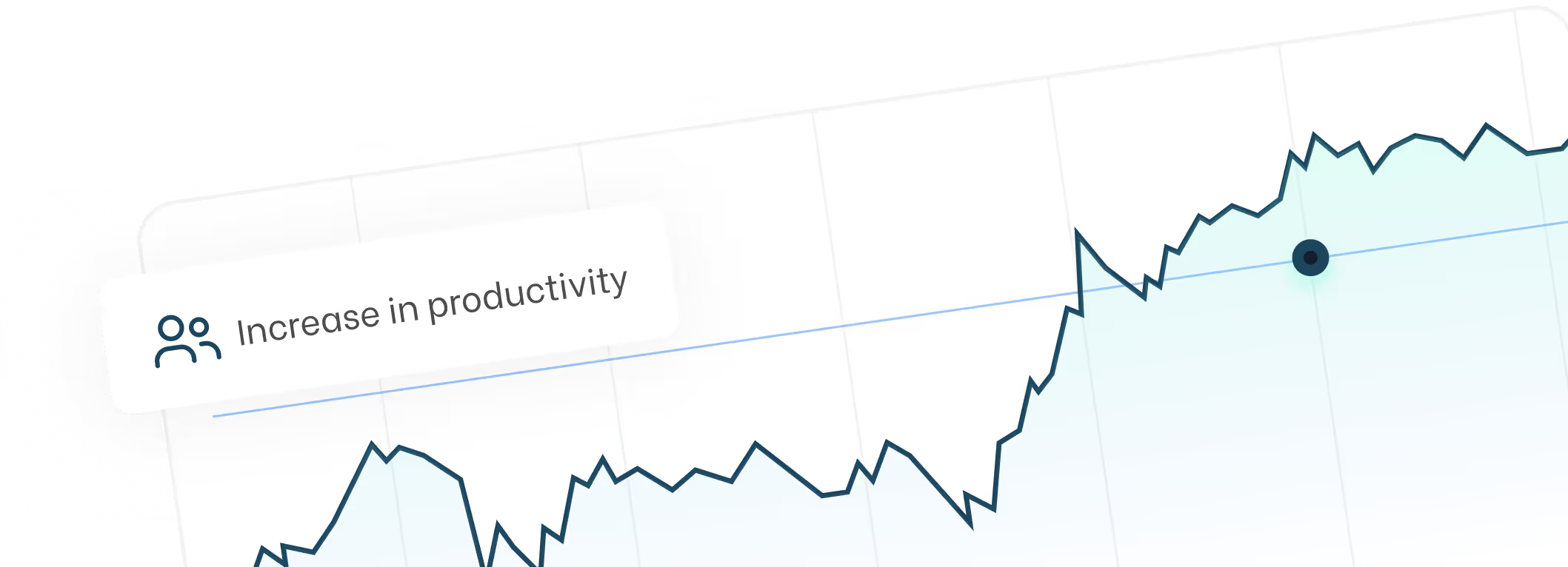What Is POS 19? A Quick Guide to Medical Billing for Off-Campus Outpatient
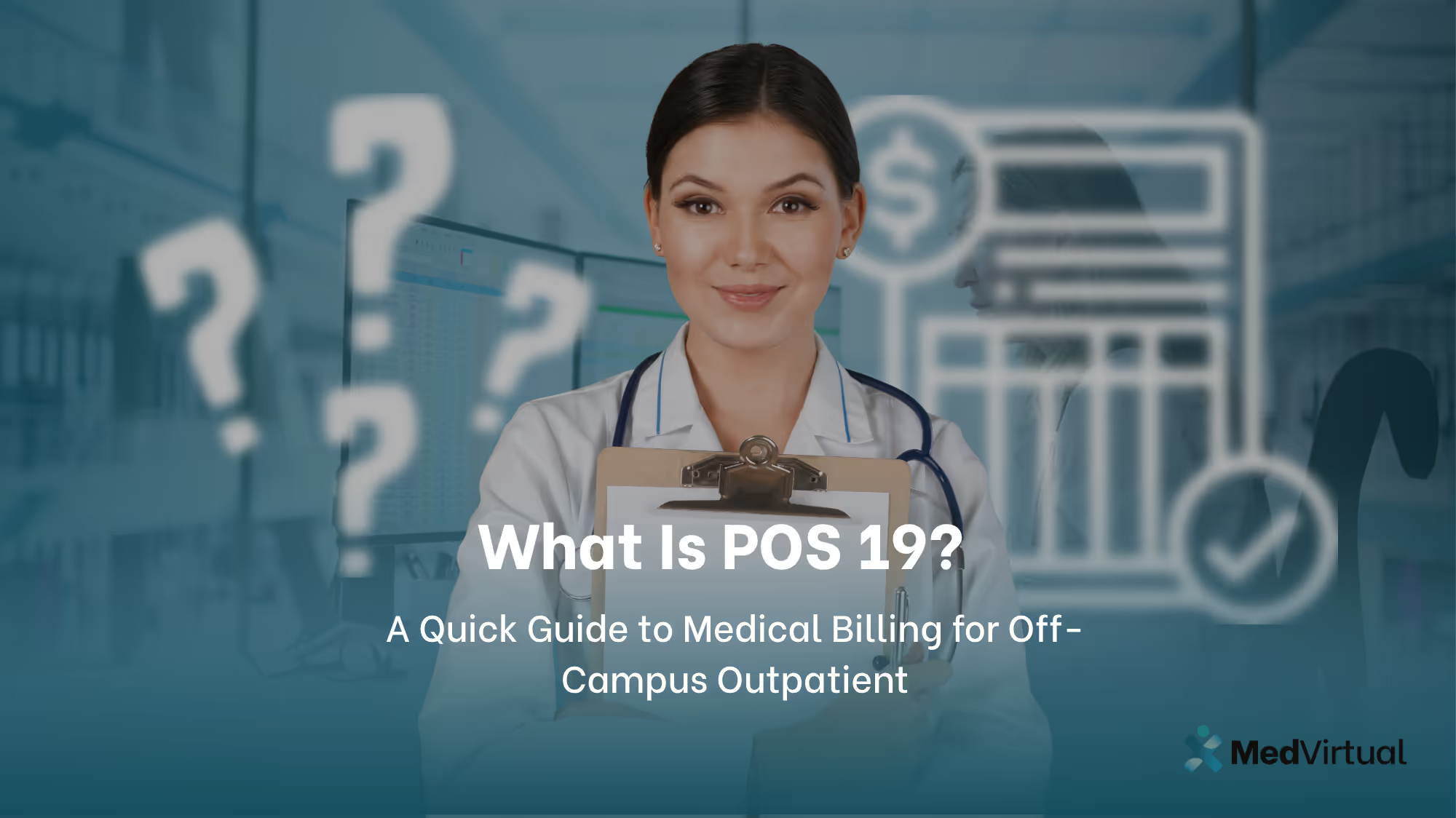
POS 19, or Place of Service 19, is a medical billing code used in the United States to designate off-campus outpatient hospital services. Established by the Centers for Medicare & Medicaid Services (CMS) in 2016, this code helps differentiate services provided at hospital-affiliated locations that are separate from the hospital’s main campus. In this article, we’ll explain what POS 19 means in the US healthcare system, its proper usage, and its significance in medical billing and reimbursement.
Key Takeaways
- POS 19, or Place of Service 19, is specifically for off-campus outpatient hospital services, allowing consistent Medicare billing for non-hospitalized patients.
- Accurate usage of POS codes, especially POS 19, is critical for healthcare providers to ensure compliance, maximize reimbursement, and prevent claim denials.
- Differences in reimbursement rates between POS codes, particularly between POS 19 and POS 22, necessitate careful billing to reflect the unique operational costs and service settings.
Understanding POS 19 in Medical Billing

POS 19, or Place of Service 19, is classified as Off-Campus Outpatient Hospital. Key points about POS 19 include:
- It applies to services provided at hospital-affiliated facilities located away from the main hospital campus.
- It was introduced formally on January 1, 2016.
- POS 19 was created to distinguish off-campus hospital services in Medicare billing.
Services billed under POS 19 include diagnostic and therapeutic treatment that does not require hospitalization. These services follow the same paid payment policies as those in POS 22, which is for on-campus outpatient services. This means that the billing process and reimbursement rates are aligned, ensuring consistency and fairness across different service locations.
POS 19 is specifically applicable for hospital-owned outpatient departments not situated on the main hospital campus. Clearly defining these services with POS 19 streamlines the billing process and ensures accurate compensation for healthcare providers.
When to Use POS 19
POS 19 is used for outpatient hospital services conducted off-campus, enabling providers to bill for services at these locations. Health care providers must use POS 19 when delivering diagnostic or therapeutic services to patients who do not require hospitalization. This ensures that the services are billed accurately and in compliance with Medicare and other payer regulations.
Accurate application of POS codes maintains compliance and ensures providers receive appropriate reimbursement. The correct POS code adheres to regulatory requirements and minimizes claim denials and financial losses.
Differences Between POS 19 and POS 22
POS 19 represents off-campus outpatient hospital departments, while POS 22 denotes outpatient services provided on a hospital’s main campus. The primary difference between these two codes lies in their location settings; POS 19 is for services rendered at off-campus hospital provider-based departments, whereas POS 22 services are delivered within the main campus of the hospital.
The operational overhead costs and staffing requirements may differ significantly for facilities using POS 19 compared to those using POS 22. These differences influence how services are managed and billed, affecting the overall cost structure and reimbursement rates for the respective locations.
Importance of Accurate POS 19 Usage
Accurate usage of POS codes is crucial for medical billing, impacting reimbursement rates based on service location. Accurate coding reflects the unique operational costs associated with off-campus outpatient services. Awareness of how different insurance companies reimburse off-campus services helps healthcare providers maximize revenue cycle management through service codes.
Errors in POS coding may result in:
- Increased administrative burdens due to the need for claim resubmissions.
- Exposure of healthcare providers to legal issues and potential fines.
- Triggering of regulatory audits, complicating compliance and operational efficiency.
The reputation risks arising from billing errors are significant. They can affect patient trust and the ability to attract new patients. Therefore, healthcare providers must use POS 19 correctly to maintain their reputation and ensure smooth operations.
Practical Examples of POS 19 Billing
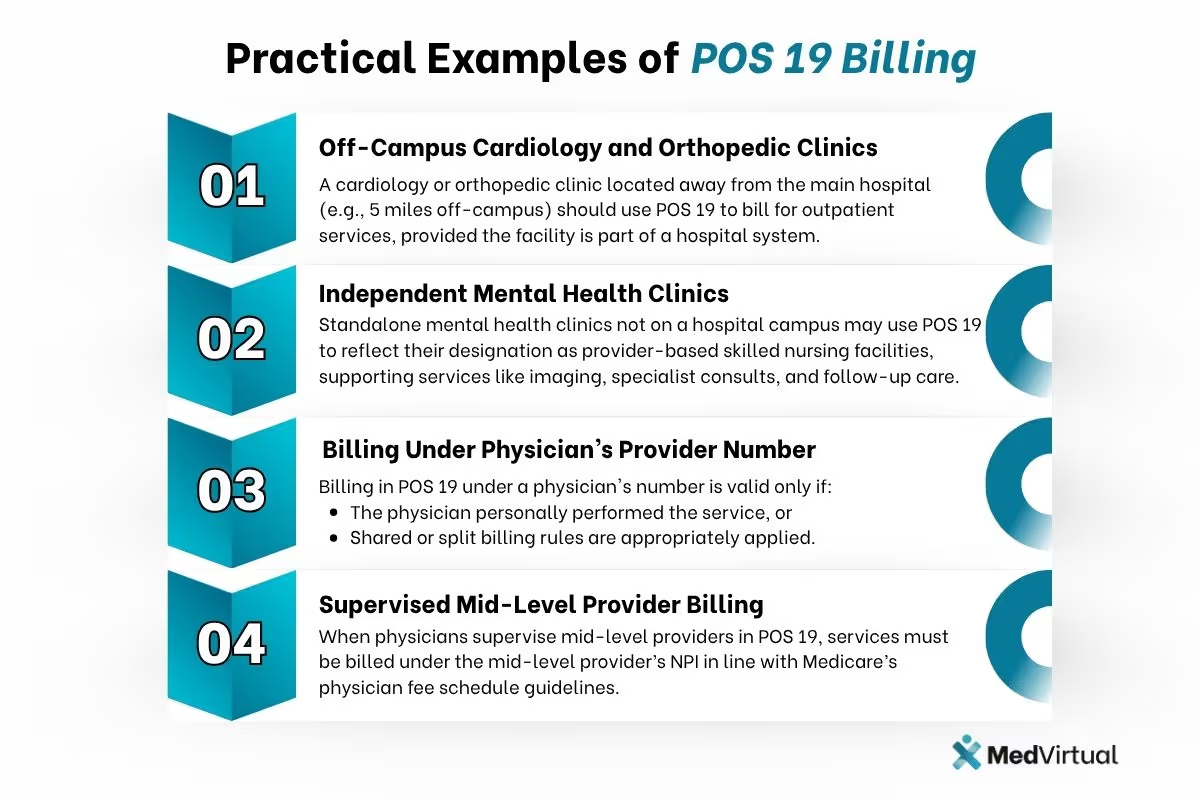
A cardiology clinic located 5 miles from the main hospital should use POS 19 when billing for outpatient services provided at that site. Similarly, an orthopedic practice located off-campus can leverage POS 19 to categorize services rendered to patients in a facility that is part of a hospital system, following the appropriate procedure.
A mental health independent clinic operating away from the hospital campus may adopt place of service pos 19 for billing purposes, reflecting its status as a provider-based skilled nursing facility. Services at POS 19 locations may include diagnostic imaging, specialist consultations, and post-surgical follow-up care.
Billing services under a physician’s provider number in POS 19 requires the following:
- The physician must have performed the service.
- Alternatively, shared or split billing guidelines must be followed.
- Physicians supervising mid-level providers in POS 19 must ensure that services are billed under the mid-level provider’s own National Provider Identifier (NPI) according to the medicare physician fee schedule.
Reimbursement Implications for POS 19
The implementation of POS 19 began on January 1, 2016, allowing for clear billing and reimbursement for outpatient services delivered outside the primary hospital location. CMS states introduced POS 19 to better capture data on outpatient services delivered at off-campus hospital locations.
Reimbursement rates for POS codes differ based on location and service classification:
- POS 19 reimbursement rates can differ from those for POS 22, often reflecting the overall cost structure and services provided at the respective locations.
- Medicare reimbursement rates differ significantly between POS codes.
- POS 19 typically receives lower payments than POS 11 due to its classification as off-campus outpatient care.
The correct POS code directly impacts reimbursement rates and claim approvals. Grasping POS 19 helps healthcare providers maximize reimbursement and minimize denied claims. Incorrect POS codes can lead to claim denials, significantly disrupting cash flow for medical practices.
POS Codes Overview
Coverage for services under POS 19 may vary by payer, impacting patient access and billing processes. Medicare and private insurance often have distinct coverage policies based on whether the outpatient service is coded using POS 19 or POS 22, impacting eligibility for certain treatments.
POS codes and their corresponding healthcare settings:
- POS 11: A Physician’s office where health professionals conduct examinations and treatments on an outpatient basis.
- POS 12: A home setting where patients receive care in their private residences.
- POS 20: An urgent care facility, distinct from a hospital emergency room, designed for immediate medical attention to unscheduled patients. Place of service codes are essential for categorizing these settings.
Understanding each POS code and its specific applications is crucial for accurate billing and reimbursement. Familiarizing with these codes ensures healthcare providers use the correct codes for each service, optimizing billing practices with the current pos code.
POS 19 vs. Other Common POS Codes
Billing under POS 19 is applicable for services such as face-to-face behavioral counseling for obesity, similar to how these services are billed under POS 22. However, POS 15 designates a mobile unit which provides healthcare services at various locations, contrasting with POS 19 which specifies off-campus outpatient hospital departments.
POS 02 refers to telehealth services offered in locations other than the patient’s home, while POS 10 designates telehealth services provided specifically in the patient’s home. Understanding these differences helps apply the correct POS code for each service setting, ensuring compliance and proper reimbursement.
Eligibility Criteria for POS 19
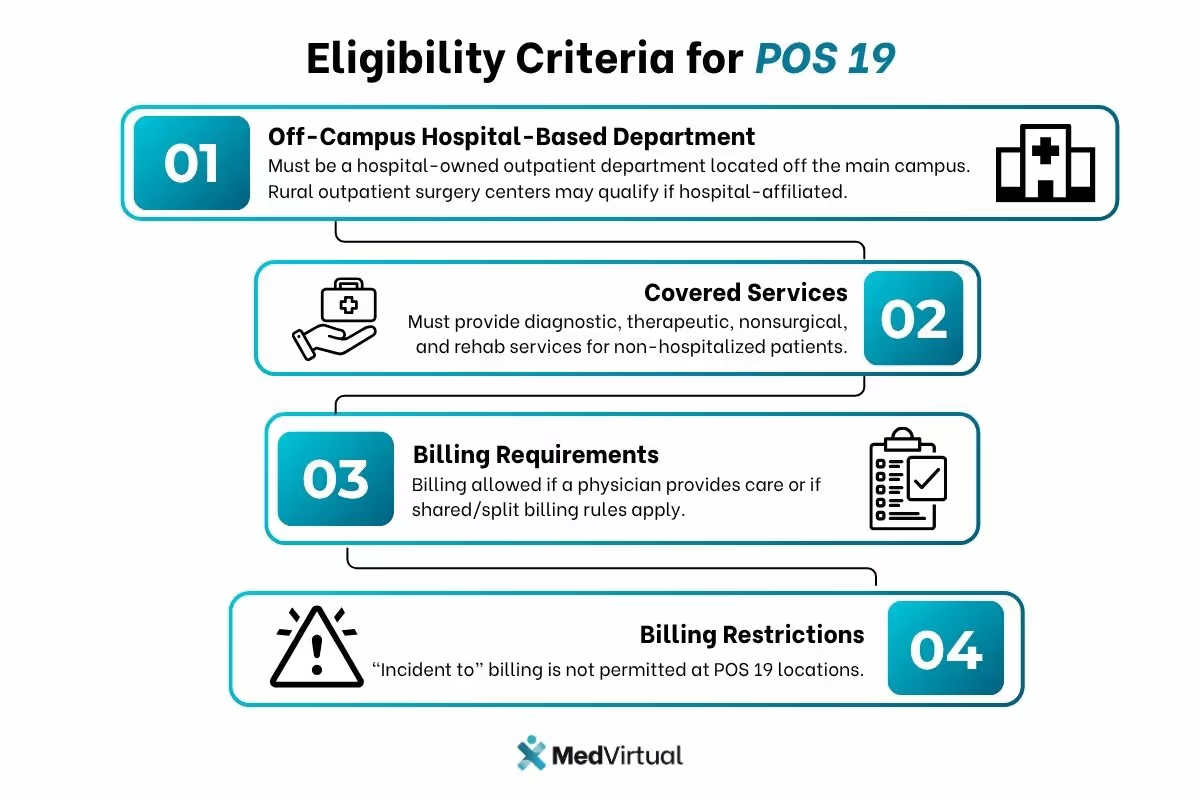
To qualify for POS 19, a location must be an off-campus hospital provider-based department that delivers outpatient services without requiring patient hospitalization. In rural settings, a small outpatient surgery center can apply POS 19 to denote surgical services that are part of a hospital-owned operation, even if it’s physically distant from the main campus.
Medical services provided at POS 19 must include diagnostic, therapeutic, and nonsurgical and rehabilitation services to sick for patients who are not hospitalized. Billing for services under POS 19 requires that either the physician provides diagnostic therapeutic service or the situation aligns with shared/split billing guidelines, including diagnostic therapeutic both surgical services.
The guidelines for incident to billing procedures do not apply for services rendered in locations classified as POS 19. A non facility must meet these criteria for accurate billing and compliance.
Consequences of Incorrect POS Coding
Incorrect POS coding can lead to claim denial or reduced payments, affecting the financial stability of healthcare practices. Claims submitted with the incorrect POS code can lead to denials or underpayments, particularly when there are differences between Medicare and commercial payer policies.
When services are billed under POS 19, providers may face stricter documentation requirements compared to when billing for services under POS 11 or POS 22. Payers may treat services billed under POS 19 differently, often requiring separate protocols and documentation compared to those billed under POS 22.
The accuracy of POS coding is essential to avoid financial penalties and ensure proper reimbursement, as the primary purpose of maintaining precise and compliant billing practices helps healthcare providers protect their revenue and operational efficiency.
Ready to Optimize Your Medical Billing with POS 19?
Understanding and accurately using POS 19 is paramount for healthcare providers. It impacts reimbursement rates, compliance, and the overall efficiency of medical billing practices. By following the guidelines and ensuring proper application, healthcare providers can maximize their revenue, streamline their billing processes, and maintain a reputable practice. Accurate POS 19 usage is not just about compliance; it’s about ensuring that every service provided is recognized and compensated fairly.

Frequently Asked Questions
What is POS 19?
POS 19 refers to a Place of Service code for billing outpatient hospital services conducted off-campus from the main hospital. This designation is crucial for accurate healthcare billing and reimbursement processes.
When should I use POS 19?
You should use POS 19 when providing diagnostic or therapeutic services to patients at off-campus hospital-affiliated facilities where hospitalization is not required. This designation ensures proper billing and coding for outpatient services.
How does POS 19 differ from POS 22?
POS 19 signifies off-campus outpatient hospital departments, whereas POS 22 indicates outpatient services offered at the hospital's main campus.
What are the consequences of incorrect POS coding?
Incorrect POS coding can result in claim denials, lower reimbursement rates, and increased administrative workload, potentially leading to legal complications. Ensuring accurate coding is essential to avoid these negative outcomes.
What are the eligibility criteria for using POS 19?
To use POS 19, the location must be an off-campus hospital provider-based department that provides outpatient services without necessitating patient hospitalization.


